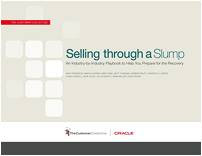When I first was trained in selling, I learned an early form of solutions sell ling. I was taught to present FAB's--Features, Advantages, Benefits. It's still an approach sales people take today. We have our products, we present the FAB's in terms of addressing the customer's needs and requirements, hoping to present superior value to the customer. It's a model familiar to all sales people and one in which we have well trained our customers to understand.
Things have changed. Imagine, a customer--let's say she's a CIO and is looking for a new software solution. We're there, presenting our FAB's and she selects us--sounds familiar. The challenge is, that while this project is very important to our CIO, she has to sell or resell her management on allocating funds for this project---it was in the budget, but those budget dollars have a tendency to be cut.
As a sales professional, you've done your job. You've developed a great business case, with a compelling ROI and Payback. She takes that to the executive management team and guess what, they decide to invest their money in a project the manufacturing VP has presented, or they want to do a stock repurchase, or some other higher priority project takes those funds---we won the sale, we (and our CIO) didn't get the order.
Or imagine another case. The CIO's project is at the top of the management team's hit parade. They want to go forward, but they don't have the money--they can't pay for it.
Our job as sales professionals has changed, it is no longer sufficient (and hasn't been for a long time) to present our product FAB's and win. We have to take a broader view of things--we have to take a business point of view in determining our FAB's and presenting the FAB's of our business solution.
For example, our competition has changed. We no longer have to compete against our product competitors, we have do compete against using those funds for other things, other projects, or doing nothing at all. We have to look beyond our product, beyond our "decisionmaker" to the overall business. Today, I find, if a project isn't in the top 3 of the executive team's hit parade, there is great risk, regardless of the business analysis you have done for your decisionmaker, to getting the deal. As sales professionals, we have to look at the overall business, developing compelling FAB's not just for our product but how this project is compelling for the business as a whole---and we have to help our customers sell it!
Let's take another example. There are lots of customers who urgently want to buy your product, but they don't have the money to pay for your product. Any company that does not have some sort of alternatives---features---to their financing their offerings will be outsold by competitors that do. We need to have an expanded view of our offerings and the FAB's we associate with them. It's not just the FAB's for the product, but it may include financing offerings, different payment terms, or ideas that help the customer pay for the product they want to buy.
While we're on the topic, we need to look at the FAB's of our business solutions, not our products. Those FAB's may include financing offerings. They include the reputation and confidence customers have in our company. They include being easy to do business with, being customer service oriented and customer focused. They include our personal reputations, the relationships we form, and the trust our customers have in as as trusted advisers. They include the value we bring in presenting the FAB's for business solutions to their highest priority business problems.
If you are still presenting FAB's to your products --- and too much of our product materials focus only on this --- then you aren't positioning yourself to win. Change your point of view to align with the customer's and solve their problems.


